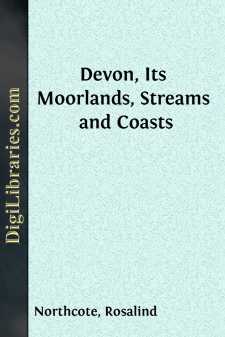Categories
- Antiques & Collectibles 13
- Architecture 36
- Art 48
- Bibles 22
- Biography & Autobiography 813
- Body, Mind & Spirit 142
- Business & Economics 28
- Children's Books 17
- Children's Fiction 14
- Computers 4
- Cooking 94
- Crafts & Hobbies 4
- Drama 346
- Education 46
- Family & Relationships 57
- Fiction 11829
- Games 19
- Gardening 17
- Health & Fitness 34
- History 1377
- House & Home 1
- Humor 147
- Juvenile Fiction 1873
- Juvenile Nonfiction 202
- Language Arts & Disciplines 88
- Law 16
- Literary Collections 686
- Literary Criticism 179
- Mathematics 13
- Medical 41
- Music 40
- Nature 179
- Non-Classifiable 1768
- Performing Arts 7
- Periodicals 1453
- Philosophy 64
- Photography 2
- Poetry 896
- Political Science 203
- Psychology 42
- Reference 154
- Religion 513
- Science 126
- Self-Help 84
- Social Science 81
- Sports & Recreation 34
- Study Aids 3
- Technology & Engineering 59
- Transportation 23
- Travel 463
- True Crime 29
Devon, Its Moorlands, Streams and Coasts
Categories:
Description:
Excerpt
Exeter
'Richmond! When last I was at Exeter,The mayor in courtesy show'd me the castle,
And call'd it Rougemont: at which name I started,
Because a bard of Ireland told me once,
I should not live long after I saw Richmond.'
King Richard III., Act IV, Sc. ii.
There are not many towns which stir the imagination as much as Exeter. To all West-Countrymen she is a Mother City ... and there is not one among them, however long absent from the West, who does not feel, when he sets foot in Exeter, that he is at home again, in touch with people of his own blood and kindred.... In Exeter all the history of the West is bound up—its love of liberty, its independence, its passionate resistance to foreign conquerors, its devotion to lost causes, its loyalty to the throne, its pride, its trade, its maritime adventure—all these many strands are twined together in that bond which links West-Countrymen to Exeter.' Mr Norway is a West-Countryman, and he sums up very justly the sentiment, more or less consciously realized, of the people for whom he speaks, and especially the feeling of the citizens.
Not only the Cathedral, the Castle, and Guildhall, bear legends for those who know how to read them, but here and again through all the streets an ancient house, a name, or a tower, will bring back the memory of one of the stirring events that have happened. One royal pageant after another has clattered and glittered through the streets, and the old carved gabled houses in the side-lanes must many a time have shaken to the heavy tramp of armed men, gathered to defend the city or to march out against the enemy.
'Exeter,' says Professor Freeman, 'stands distinguished as the one great English city which has, in a more marked way than any other, kept its unbroken being and its unbroken position throughout all ages. It is the one city in which we can feel sure that human habitation and city life have never ceased from the days of the early Cæsars to our own.... The city on the Exe, Caerwisc, or Isca Damnoniorum, has had a history which comes nearer than that of any other city of Britain to the history of the ancient local capitals of the kindred land of Gaul.... To this day, both in feeling and in truth, Exeter is something more than an ordinary county town.'
Exeter from ExwickThe city is very picturesquely placed, and before ruthless 'improvements' swept away the old gates and many ancient buildings, the general effect must have been particularly delightful. 'This City is pleasantly seated upon a Hill among Hills, saving towards the sea, where 'tis pendant in such sort as that the streets (be they never so foul) yet with one shower of rain are again cleansed ...,' wrote Izacke, in his Antiquities of Exeter. 'Very beautiful is the same in building;' and he ends with some vagueness, 'for considerable Matters matchable to most Cities in England.' The earliest history can only be guessed at from what is known of the history of other places, and from the inferences to be drawn from a few scanty relics; but there is evidence that Exeter existed as a British settlement before the Romans found their way so far West....


